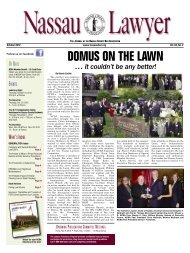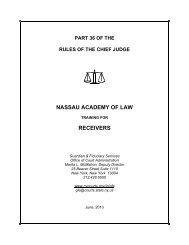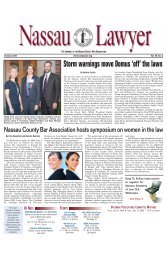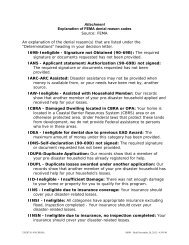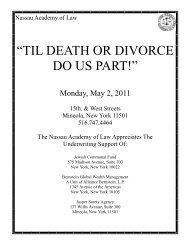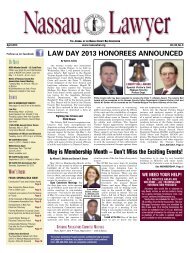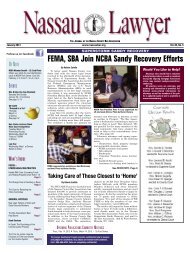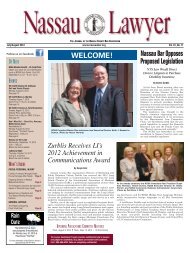302 B.R. 760 Page 14302 B.R. 760(Cite as: 302 B.R. 760)In the end, despite Sharp's efforts to cast State Streetas an instigator and active participant in the Spitzes'scheme, the complaint cannot overcome the absence<strong>of</strong> any duty on State Street's part to protect Sharp'sinterests. Indeed, each <strong>of</strong> the alleged affirmative actsthat Sharp identifies as comprising State Street's"substantial assistance" are at root omissions-- failuresto act. By allowing Sharp continued access tothe line <strong>of</strong> credit, for instance, State Street in essencepreserved the status quo. Although it would havebeen in the long-term best interests <strong>of</strong> Sharp (and itsother creditors) for State Street to have immediatelycut <strong>of</strong>f the Spitzes' access to the revolving loan facilityand loan proceeds, State Street owed Sharp noduty <strong>of</strong> loyalty, and had no obligation to put Sharp'sinterests ahead <strong>of</strong> its own. Similarly, State Streetcould possibly have thwarted the fraud by disclosingwhat it knew to the Noteholders prior to the closing<strong>of</strong> the second financing. However, in the absence <strong>of</strong> aduty to disclose its knowledge <strong>of</strong> the Spitzes' fraud,State Street cannot be held liable for its failure torespond to inquiries from the Noteholders' representative.[FN8] See Renner, 2000 WL 781081, at *9(concluding that a bank <strong>of</strong>ficial did not aid and abet acustomer's fraud by "fail[ing] to respond" to inquiriesconcerning the customer). Indeed, the failure to answeror respond to phones calls (even if motivated bya conscious desire not to disclose information) canhardly be characterized as more than inaction.FN8. Had State Street made any false ormisleading statements to the Noteholders, itmight have had a duty to correct any resultingmisimpressions. Surely, however, theNoteholders could not have viewed StateStreet's failure to respond to their inquiriesas any kind <strong>of</strong> endorsement <strong>of</strong> the proposedtransaction. If anything, under the circumstances,State Street's evasiveness mighthave aroused a prudent investor's suspicions.[16] The closest Sharp comes to identifying any act<strong>of</strong> participation by State Street is the written consentState Street gave in March 1999 to the Noteholders'purchase <strong>of</strong> $25 million in subordinated notes fromSharp. Sharp argues that State Street's act <strong>of</strong> consentingto the transaction was a sine qua non <strong>of</strong> theSpitzes' expanded fraud, since without the consent,Sharp would not have been able to borrow any additionalmoney, and the Spitzes' continued looting wasfunded in part by the additional funds advanced bythe Noteholders. However, State Street's contractuallybargained-for authority to block Sharp from furtherborrowing, did *777 not confer on the bank anaffirmative duty to protect Sharp--and still less toprotect other third-parties, such as the Noteholders--from the actions <strong>of</strong> Sharp's management. Significantly,although the consent made it possible for theSpitzes to seek additional financing through fraud,there is no allegation that State Street did anything toinduce the Noteholders to lend to Sharp. Sharp hasnot alleged, for example, that the consent was intendedas--or could have been reasonably interpretedby the Noteholders to be--a representation by StateStreet as to Sharp's creditworthiness. More importantly,although State Street may have anticipatedthat the Spitzes would continue to loot the company,they had no duty to intervene to prevent breaches <strong>of</strong>fiduciary duty by Sharp's management.Equally unavailing are Sharp's efforts to hold StateStreet accountable for encouraging or inducing theSpitzes to expand the scope <strong>of</strong> their fraud. Althoughthe case law and the Restatement identify "inducement"as an independent form <strong>of</strong> participation, thereis scant authority setting forth exactly what conductwould qualify as inducement in this context. SeeSharp Mem. at 13 ("[W]e are not aware <strong>of</strong> any mention<strong>of</strong> inducement <strong>of</strong> this sort in the case law...."). Inits complaint, Sharp asserts thaton November 30, 1998, State Street demanded andobtained Sharp's agreement to secure new financingfrom investors unaware <strong>of</strong> the fraud, and to usethat financing to pay <strong>of</strong>f State Street's line <strong>of</strong> credit.In exchange, State Street agreed to give Sharp untilMarch 31, 1999 to obtain this new financing and toretire the debt to State Street.Compl. 50. The Bankruptcy Court concluded thatthis pleading violated Rule 9(b), "by failing to allegewho made the demand, who else was present, exactlywhat was said, and where this occurred." Bankr.Dec.at 517.Assuming that Rule 9(b) applies to these allegations,and that the pleading falls short <strong>of</strong> the rule's particularitythreshold, this would not, <strong>of</strong> course, be groundsfor dismissal with prejudice, since Sharp could begranted leave to replead to provide more detail. SeeLuce v. Edelstein, 802 F.2d 49, 56 (2d Cir.1986)("Complaints dismissed under Rule 9(b) are almostalways dismissed with leave to amend."); accord© 2009 Thomson Reuters. No Claim to Orig. US Gov. Works.
302 B.R. 760 Page 15302 B.R. 760(Cite as: 302 B.R. 760)United Feature Syndicate, Inc. v. Miller FeaturesSyndicate, Inc., 216 F.Supp.2d 198, 225(S.D.N.Y.2002). However, even accepting the adequacy<strong>of</strong> Sharp's pleading under Rule 9(b), it is difficultto see how State Street could be held accountablefor inducing a fraudulent scheme that was well underwaybefore State Street is alleged to have evenhad any knowledge <strong>of</strong> it. The allegations <strong>of</strong> the complaintamply demonstrate that the Spitzes required noencouragement or inducement to defraud creditors orto breach the duties <strong>of</strong> loyalty that they owed Sharp.Indeed, more than half <strong>of</strong> the $44 million stolen bythe Spitzes had already been diverted by the timeState Street allegedly discovered the fraud.Although Sharp has adequately pled State Street'sknowledge <strong>of</strong> the Spitzes' scheme, the failure <strong>of</strong> thecomplaint to identify any affirmative act <strong>of</strong> participationin the Spitzes' breach <strong>of</strong> their fiduciary duties toSharp necessitates the dismissal <strong>of</strong> the complaint forfailure to state a claim.(2)Fraudulent Conveyance ClaimsConstructive Fraudulent Conveyance[17] The D.C.L., under which Sharp brings the second,third, fourth and fifth counts <strong>of</strong> its complaint, isNew York's version <strong>of</strong> the Uniform Fraudulent ConveyancesAct (the "U.F.C.A."). The statute *778codifies a set <strong>of</strong> legal principles that are intended to"protect creditors by invalidating certain transactionsthat render debtors' assets unreachable." Note, GoodFaith & Fraudulent Conveyances, 97 Harv. L.Rev.495, 495 (1983).In the second, third, and fourth counts <strong>of</strong> the complaint,Sharp alleges that the $12 million paymentthat State Street received from Sharp in April 1999,in satisfaction <strong>of</strong> Sharp's valid pre-existing debt toState Street, constitutes a constructive fraudulentconveyance under the D.C.L.Pursuant to the D.C.L. a conveyance by a debtor isdeemed constructively fraudulent if it is made without"fair consideration," as defined in the statute, andany <strong>of</strong> the following conditions is met: 1) the transferoris insolvent or will be rendered insolvent by thetransfer in question [FN9]; 2) the transferor makingthe conveyance is a defendant in an action for moneydamages who fails to satisfy a judgment enteredagainst him [FN10]; 3) the transferor is engaged or isabout to engage in a business transaction for whichits remaining property constitutes unreasonably smallcapital [FN11]; or 4) the transferor believes that itwill incur debts beyond its ability to pay. [FN12]FN9. See D.C.L. § 273 ("Every conveyancemade ... by a person who is or will bethereby rendered insolvent is fraudulent asto creditors without regard to his actual intentif the conveyance is made ... without afair consideration.").FN10. See D.C.L. § 273a ("Every conveyancemade without fair consideration whenthe person making it is a defendant in an actionfor money damages or a judgment insuch an action has been docketed againsthim, is fraudulent as to the plaintiff in thataction without regard to the actual intent <strong>of</strong>the defendant if, after final judgment for theplaintiff, the defendant fails to satisfy thejudgment.").FN11. See D.C.L. § 274 ("Every conveyancemade without fair consideration whenthe person making it is engaged or is aboutto engage in a business or transaction forwhich the property remaining in his handsafter the conveyance is an unreasonablysmall capital, is fraudulent as to creditorsand as to other persons who become creditorsduring the continuance <strong>of</strong> such businessor transaction without regard to his actualintent.").FN12. See D.C.L. § 275 ("Every conveyancemade ... without fair considerationwhen the person making the conveyance ...intends or believes that he will incur debtsbeyond his ability to pay as they mature, isfraudulent as to both present and futurecreditors.").Sharp alleges that the challenged payment to StateStreet was made while Sharp was insolvent; that atthe time <strong>of</strong> the payment Sharp was engaged or wasabout to engage, in a transaction for which the propertyremaining in its possession constituted unreasonablysmall capital; and that Sharp believed itwould incur debts beyond its ability to pay. See© 2009 Thomson Reuters. No Claim to Orig. US Gov. Works.
- Page 1 and 2:
Nassau Academy of LawCLE Live Class
- Page 3 and 4:
McKinney's Debtor and Creditor Law
- Page 5 and 6:
McKinney's Debtor and Creditor Law
- Page 7 and 8:
McKinney's Debtor and Creditor Law
- Page 9 and 10:
McKinney's Debtor and Creditor Law
- Page 11 and 12:
McKinney's Debtor and Creditor Law
- Page 13 and 14: McKinney's Debtor and Creditor Law
- Page 15 and 16: McKinney's Debtor and Creditor Law
- Page 17 and 18: McKinney's Debtor and Creditor Law
- Page 19 and 20: BAKER & HOSTETLER LLP45 Rockefeller
- Page 21 and 22: usiness of defendant Bernard L. Mad
- Page 23 and 24: BACKGROUND, THE TRUSTEE, AND STANDI
- Page 25 and 26: Madoff who received fraudulent tran
- Page 27 and 28: ased on fictitious profits and for
- Page 29 and 30: 28. BLMIS funds were also used to p
- Page 31 and 32: Madoff, and her niece, Shana Madoff
- Page 33 and 34: 42. Ruth Madoff was never an employ
- Page 35 and 36: FIRST CAUSE OF ACTIONTURNOVER AND A
- Page 37 and 38: 66. At the time of each of the Two-
- Page 39 and 40: Transfers; (b) directing that the S
- Page 41 and 42: EIGHTH CAUSE OF ACTIONUNDISCOVERED
- Page 43 and 44: TENTH CAUSE OF ACTIONDISALLOWANCE O
- Page 45 and 46: 111. Mrs. Madoff benefited from the
- Page 47 and 48: WHEREFORE, the Trustee respectfully
- Page 49 and 50: 2(c)(3): (a) preserving the Subsequ
- Page 51 and 52: 302 B.R. 760 Page 1302 B.R. 760(Cit
- Page 53 and 54: 302 B.R. 760 Page 3302 B.R. 760(Cit
- Page 55 and 56: 302 B.R. 760 Page 5302 B.R. 760(Cit
- Page 57 and 58: 302 B.R. 760 Page 7302 B.R. 760(Cit
- Page 59 and 60: 302 B.R. 760 Page 9302 B.R. 760(Cit
- Page 61 and 62: 302 B.R. 760 Page 11302 B.R. 760(Ci
- Page 63: 302 B.R. 760 Page 13302 B.R. 760(Ci
- Page 67 and 68: 302 B.R. 760 Page 17302 B.R. 760(Ci
- Page 69 and 70: 302 B.R. 760 Page 19302 B.R. 760(Ci
- Page 71 and 72: 394 B.R. 721 Page 1394 B.R. 721, 50
- Page 73 and 74: 394 B.R. 721 Page 3394 B.R. 721, 50
- Page 75 and 76: 394 B.R. 721 Page 5394 B.R. 721, 50
- Page 77 and 78: 394 B.R. 721 Page 7394 B.R. 721, 50
- Page 79 and 80: 394 B.R. 721 Page 9394 B.R. 721, 50
- Page 81 and 82: 394 B.R. 721 Page 11394 B.R. 721, 5
- Page 83 and 84: 394 B.R. 721 Page 13394 B.R. 721, 5
- Page 85 and 86: 394 B.R. 721 Page 15394 B.R. 721, 5
- Page 87 and 88: 394 B.R. 721 Page 17394 B.R. 721, 5
- Page 89 and 90: 394 B.R. 721 Page 19394 B.R. 721, 5
- Page 91 and 92: 394 B.R. 721 Page 21394 B.R. 721, 5
- Page 93 and 94: 397 B.R. 642 Page 2397 B.R. 642(Cit
- Page 95 and 96: 397 B.R. 642 Page 4397 B.R. 642(Cit
- Page 97 and 98: 397 B.R. 642 Page 6397 B.R. 642(Cit
- Page 99 and 100: 397 B.R. 642 Page 8397 B.R. 642(Cit
- Page 101 and 102: 397 B.R. 642 Page 10397 B.R. 642(Ci
- Page 103 and 104: 397 B.R. 642 Page 12397 B.R. 642(Ci
- Page 105 and 106: 397 B.R. 642 Page 14397 B.R. 642(Ci
- Page 107 and 108: 443 F.3d 180 Page 2443 F.3d 180(Cit
- Page 109 and 110: 443 F.3d 180 Page 4443 F.3d 180(Cit
- Page 111 and 112: 443 F.3d 180 Page 6443 F.3d 180(Cit
- Page 113 and 114: 443 F.3d 180 Page 8443 F.3d 180(Cit
- Page 115 and 116:
443 F.3d 180 Page 10443 F.3d 180(Ci
- Page 117 and 118:
443 F.3d 180 Page 12443 F.3d 180(Ci
- Page 119 and 120:
Page 2257 A.D.2d 526, 684 N.Y.S.2d
- Page 121 and 122:
Page 4257 A.D.2d 526, 684 N.Y.S.2d
- Page 123 and 124:
Page 6257 A.D.2d 526, 684 N.Y.S.2d
- Page 125 and 126:
770 N.Y.S.2d 421 Page 22 A.D.3d 780
- Page 127 and 128:
Page 14 A.D.3d 495, 773 N.Y.S.2d 71
- Page 129:
Page 34 A.D.3d 495, 773 N.Y.S.2d 71
- Page 132 and 133:
780 N.Y.S.2d 409 Page 29 A.D.3d 553
- Page 134 and 135:
Page 134 A.D.3d 231, 824 N.Y.S.2d 3
- Page 136 and 137:
Page 334 A.D.3d 231, 824 N.Y.S.2d 3
- Page 138 and 139:
Page 2991 F.2d 31(Cite as: 991 F.2d
- Page 140 and 141:
Page 4991 F.2d 31(Cite as: 991 F.2d
- Page 142 and 143:
Page 6991 F.2d 31(Cite as: 991 F.2d
- Page 144 and 145:
FRAUDULENT TRANFERENCESRonald M. Te
- Page 146 and 147:
Nursing home case_ Transfer of pers
- Page 148 and 149:
Sections 548 and 544 work in concer
- Page 150 and 151:
U.S. Supreme CourtBFP v. Resolution
- Page 152 and 153:
example, from net 15 to COD; or cha
- Page 154 and 155:
Bankruptcy Code Section§ 548. Frau
- Page 156:
Ron Terenzi is a founding partner a



